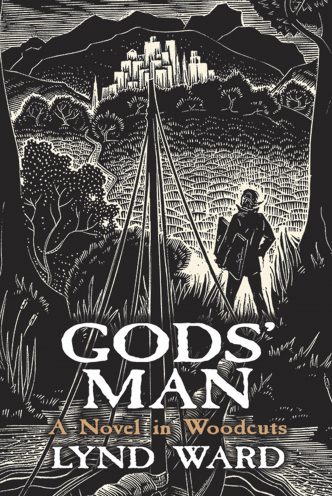 By LYND WARD (Dover; 1929/2004)
By LYND WARD (Dover; 1929/2004)
The first and most famous of the late Lynd Ward’s woodcut picture novels (others include MADMAN’S DRUM, WILD PILGRIMAGE, PRELUDE TO A MILLION YEARS, SONG WITHOUT WORDS and VERTIGO). This makes GOD’S MAN one of the first-ever graphic novels, and one that nearly a century after its initial publication still holds up remarkably well.
Highly symbolic in nature, it’s presented in a series of wordless full page images marked by bold, precisely detailed black and white draftsmanship. The framing and composition are consistently precise and well chosen (something that can’t be said for all of Ward’s picture novels), while the people are marked by oddly indistinct features and exaggerated facial expressions. This includes the protagonist of GOD’S MAN, whose featurelessness appears to have been deliberate, lending him an everyman feel.
Subtle Ward’s artwork isn’t. Nor is GOD’S MAN’S overall theme—of the artist attempting to find his way in an increasingly impersonal and commodified world—which is spelled out repeatedly by the imagery, and also the narrative, which pivots on a Faustian bargain.
The story opens with a painter emerging from the sea. One of his first encounters is with a spindly dark suited figure who has the painter sign a contract in exchange for an apparently magical rod. The painter uses the rod as a brush, creating canvases that bring him untold fame and fortune within a vast, robotic cityscape of shadows and skyscrapers. Here the painter shacks up with an alluring seductress, but the relationship quickly turns sour and he retreats to the country. In this sunlit environ things go better, for a while at least, as the painter gets married to a virtuous woman and fathers a child—but the bargain he made early on still has to be paid, and the cost, it turns out, is greater than he or we could have imagined.
As straightforward as all this is, Ward includes several enigmatic, mysterious elements, making this a book worth perusing more than once (or even twice). What ultimately resonates, however, is the macabre thrust of the narrative, which culminates in an ending, and an unforgettable final image, that (contrary to what many critics might have you believe) places GOD’S MAN firmly in horror territory.
